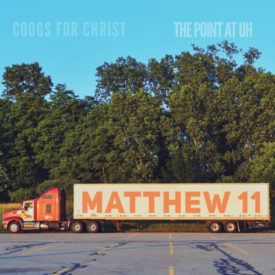
Roads and vehicles have changed the way we live. No longer are we so locally based; we assume, especially in Houston, that any in-person meeting (of the few that still exist) may require an average of a 30 minute drive each way. That’s an hour total expense driving, round-trip, plus whatever time is allotted to the meeting itself. Not only do roads and vehicles change our own personal, daily commutes, but they change the way we consume and procure daily necessities. No longer are groceries bought from a local farm for most of America; no, rather, we buy groceries that have been shipped here from all over the world, delivered a local chain store by way of a semi-trucks. Such delivery trucks are truly impressive in size and weight: a lot of mass coming down the road! Anyone with common sense respects these massive vehicles that carry so much cargo; they could very easily, accidentally cause a lot of damage if the truck driver makes a mistake or if the truck malfunctions (e.g. the breaks could go out, or the truck may flip while turning, etc.).
This is easy to imagine: busy, competitive companies and tired truck drivers on long trips—trying to add as much cargo to the truck as possible, in order to save time and money. We are, after all, a very busy and productive people in the United States. Regarding filling the truck up as much as possible, you’ve probably seen the weigh stations on the side of the interstate, installed to regulate the transportation of heavy loads of cargo on the roads for the safety of the community. Not only could a truck’s brakes malfunction if overloaded, but the roads themselves (and bridges especially!) are not invincible; they have limitations. They can and do crumble when too much weight crosses them. The hardworking men and women behind the wheel may be tired and anxious to get the job done and simply be ready to go home to their families.
BACKGROUNDS OF THE HEAVY BURDENS
In the Second Temple Period, the Pharisees and other religious leaders had added extra weight to the people of Israel; they created extra laws, a sort of “hedge” around the Law, to prevent fellow Jews from stumbling into sin or ritual impurity. This sounds good in theory perhaps, yet those laws were difficult to keep; they were a heavy load to carry. Worse yet, the Pharisees and other religious leaders who prescribed these guard-rail-type laws were not even living by those laws themselves, yet they would accuse and condemn those under their care for not keeping these laws. The problem is not necsiarily that laws are bad in and of themselves; the Torah itself, which they sought to protect, was a of course a gift from God. The Bible is very plain about that (cf. Psalm 119). Jesus very explicitly describes the problem with the religious leaders’ practices, however, in Luke 11:46.
Jesus said, “Woe also to you experts in the law! For you load people with burdens hard to bear, and you yourselves do not lift a finger to ease them.”
JESUS’ INVITATION TO A LIGHTER, BETTER WAY
In our key passage this week, Jesus invites these burdened, common Jews to follow Him now as their teacher, rather than the harsh demands of the Pharisees, Sadducees, scribes, and others. Not only is Jesus to be their rabbi, of course, but He is God’s anointed, the Davidic King and son of God, the Messiah who would eventually die for the sins of not only the Jews but all of humanity. Unlike the other religious leaders of His time on earth, Jesus will not treat the people like our modern semi-trucks, overloading them with weight to carry. Instead, He says:
Come to me, all you that are weary and are carrying heavy burdens, and I will give you rest. Take my yoke upon you, and learn from me; for I am gentle and humble in heart, and you will find rest for your souls. For my yoke is easy, and my burden is light. (Matt. 11:28-30)
Contrary to His antagonists, Jesus’ burden is light. Yet there is still a yoke, so to better understand this passage, we need to know a bit about yokes (Greek: zugo/ß, zugos). The Cultural Backgrounds of the New Testament study Bible provides a helpful definition of yoke, along with other scriptural references:
A common instrument used in the ancient Near East to bind animals together as means for production. As time passed, it was also used to bind human prisoners as a means of control and punishment (Jer 27–28). Finally, the yoke became a symbol of control, ownership, and most often political servitude (1Ki 12:4; see note on Isa 9:4). It seems that only here and in 2:20 is “yoke” used to express the reality of Yahweh’s covenant with Israel. It is more common to speak of the yoke of Egypt. However, this may be an extension of the theology of the exodus, where being freed from slavery in Egypt did not lead to unbridled freedom but to a new kind of willing bondage to Yahweh.
By Jesus’ day rabbis also sometimes spoke of the “yoke of the law” or the “yoke of the kingdom” with reference to submitting to God’s ways. Here, then, it would seem that Jesus is directly challenging the religious elites’ standards of weight to be pulled by those who would submit themselves to God’s yoke.
To be clear: there is a yoke, yet the load to be pulled is lightweight, and the yoke fits well. That is not to say that Jesus does not call us to difficult tasks; He has already made that crystal clear in chapter 10. In our key passage this week, Jesus reveals to us the heart of the Father. “No one knows the Father except the Son and those to whom the Son chooses to reveal Him.” (v.27) Our key text today contains the very next words out of Jesus’ mouth.
Yes, there are standards in the Kingdom of God. Very importantly, though, there is also grace, and anyone fortunate enough to find the Way to YHWH will have gotten there by His grace, manifested in and through Jesus. We have a God who empathizes with us such that He sends His own Son in the flesh—God’s word incarnate—to die for us, so that we may have eternal life with Him. He has paid the price to make up what we are lacking, which is a lot.
The question is: are we willing to accept it?
Jesus invites not only first century Jews, but us today to follow Him:
Come to me, all you that are weary and are carrying heavy burdens, and I will give you rest. Take my yoke upon you, and learn from me; for I am gentle and humble in heart, and you will find rest for your souls. For my yoke is easy, and my burden is light.
THE WEIGHT OF THE INFORMATION AGE
In our own day, we have more luxuries than the world has ever known: a higher standard of living, from air conditioning to comfortable clothes and transportation. Technology, with all of the help it has given us, has also burdened us. Without a full essay on the trappings of that (technology), suffice it to say that, many of us (perhaps especially college students) must take care not to be burdened by it all: the anxieties stirred up by social media, the “responsibility” to use it to speak out, the normative behavior of constantly being imposed to “stay connected.” There is more information than we can taken in, and we find ourselves in “paralysis by analysis.”
Maybe more technological progress and productivity is not what you need, actually. Maybe what you need is to make being “unplugged” as the standard and let “connection” (via internet, television, etc.) be more of an exception. What you need is not that kind of connection but rather, a real connection with your Creator: a connection that can only be facilitated by the Risen King, the Christ, Jesus our Lord. He has carried our cross, so that we may carry the cross of others. While the latter is true, today and always, with all of the needs of this world—you are still invited to recognize, consider, and accept the former: Jesus’ invitation to take upon yourself willing submission to His yoke and find rest for your soul.
Take a few moments right now in prayer and reflection. Consider what has been weighing you down and burdening your soul. Ask the Lord what your attitude should be toward it. Then, move forward in a posture of humble obedience to God, submitting yourself to His ways, including seeing yourself as a recipient of His love and mercy. Feel the light weight His gracious yoke upon you and your life, and in that, find rest for your soul.
